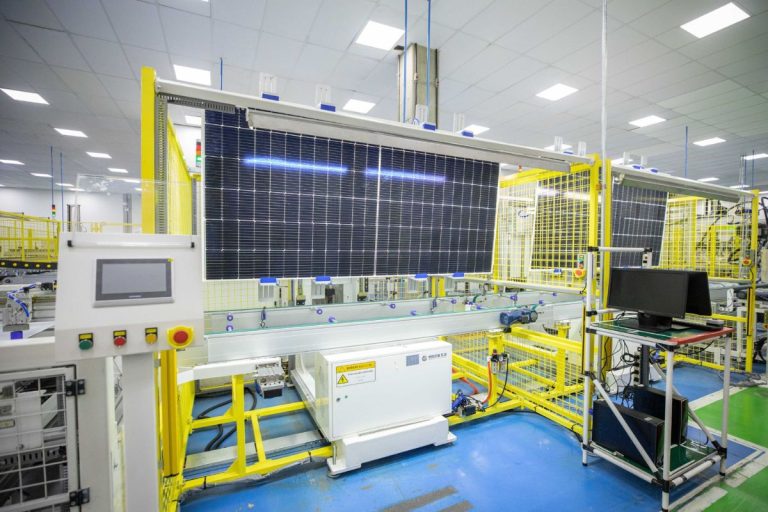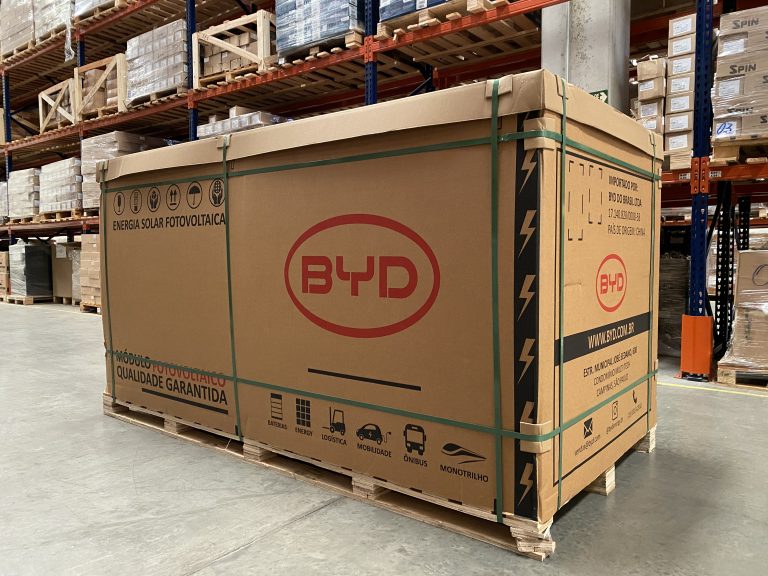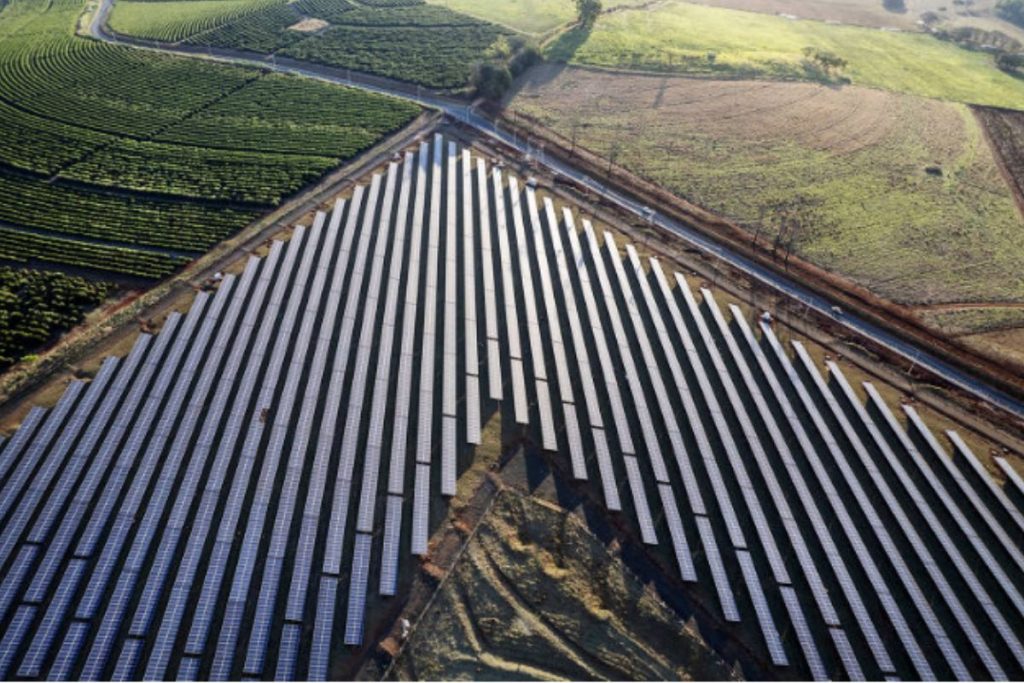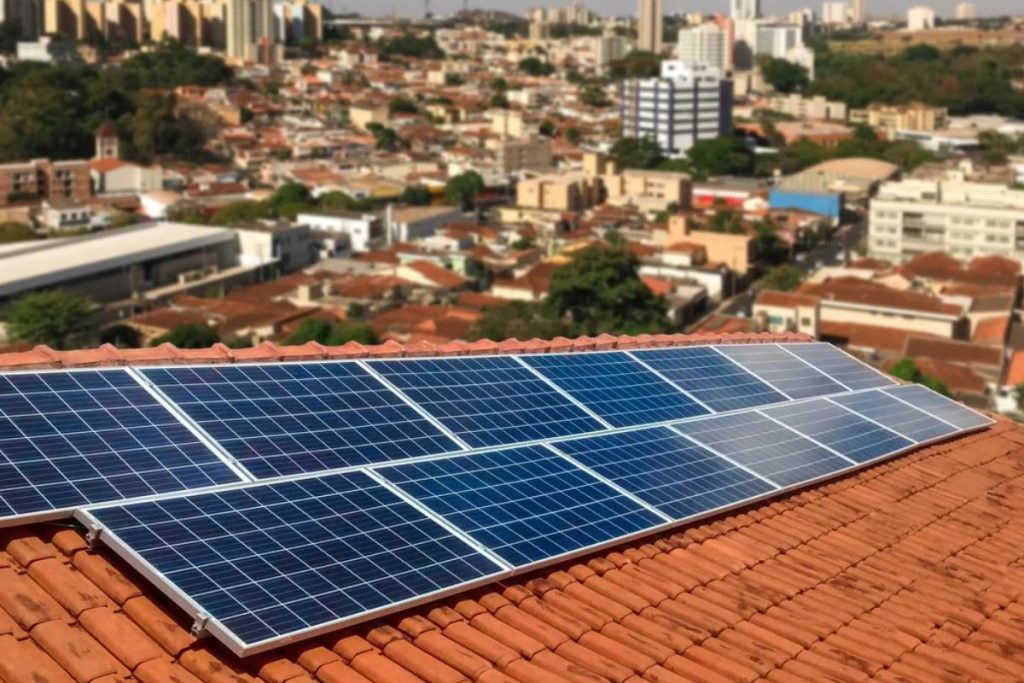When we think of solar energy systems, solar panels are usually the first component that comes to mind. But did you know that batteries play an essential role in many of these systems?
Let's explore everything you need to know about solar energy batteryWhat they are, how they work, the main types and how they can be integrated into existing solar systems. Read on!
What is a solar energy battery?
A solar energy battery is a piece of equipment designed to store the electrical energy generated by solar panels.
This stored energy can be used at a later date, ensuring greater autonomy and flexibility in energy consumption.
With the advance of technology, batteries for solar energy have become increasingly efficient and affordable, playing a strategic role in systems that aim to reduce dependence on the traditional electricity grid.
Solar batteries not only store energy for use during periods of low generation (such as at night or on cloudy days), but also make it possible to use energy at strategic times, such as during peak consumption or blackouts.
They are fundamental in systems that aim for sustainability and energy independence, such as in remote areas or modern urban projects.
How did the solar battery come about?
The history of the solar battery is intrinsically linked to the development of photovoltaic technologies and the growing interest in renewable energy in the 20th century.
Initially, the concept of storing electricity from the sun began to take shape with the development of the first solar cells in the 1950s and 1960s, when scientists and engineers were looking for ways to harness solar energy more efficiently.
The most significant advance came with the innovation of silicon photovoltaic cells, which transformed sunlight directly into electricity. However, in order to maximize the use of the energy generated and deal with the intermittent nature of the solar source (available only during the day), it became necessary to develop effective storage technologies.
Solar batteries therefore evolved from these storage needs, initially using existing technologies such as lead-acid batteries, which were widely used in other contexts. Over time, as research and development in materials advanced, more efficient and durable alternatives emerged, such as lithium-ion batteries, which are commonly employed in contemporary solar systems.
Therefore, the emergence of solar batteries is linked not only to technological advances, but also to a paradigm shift towards more sustainable energy sources that are independent of traditional grids. They continue to evolve in order to increase efficiency, storage capacity and accessibility, boosting the use of solar energy globally.
What is a solar energy battery used for?
Batteries for solar energy are essential for storing the electricity generated by photovoltaic systems, allowing it to be used later, especially at night or on cloudy days.
They offer autonomy to users, reducing dependence on the traditional electricity grid and providing a continuous supply of energy, particularly in remote areas.
These batteries also help in the efficient management of energy costs, enabling savings through strategies such as time-of-use charging. In this way, they increase the effectiveness of renewable energy, guaranteeing reliability and financial savings.
Types of systems
- Off-Grid Systems: places without access to the electricity grid.
- Hybrid systems: offer autonomy and support in the event of blackouts.
- Cost reduction: make it possible to store energy at low tariff times and use it when energy from the grid is more expensive.
Check out our guide to solar energy!
How does the battery solar energy system work?
A solar energy system with batteries stores the energy generated by the solar panels and can operate it in different ways. See below:
Off-Grid Systems

Off-grid systems, or isolated systems, are designed to operate completely independently of the conventional electricity grid.
All the energy consumed in a home, business or facility is generated by solar panels and stored in batteries.
This total independence from the grid makes them especially useful in remote locations where access to electricity is non-existent or very expensive.
How does an Off-Grid system work?
- Energy generation: during the day, solar panels convert sunlight into electricity.
- Storage: the energy generated is stored in batteries, allowing it to be used at night or on cloudy days.
- Inverter: an inverter is used to convert energy stored in direct current (DC) to alternating current (AC), which is the format used by most domestic and industrial appliances.
- Distribution: the energy stored in the batteries is distributed according to local demand.
Advantages of the Off-Grid system
- Energy independence: ideal for areas without access to the mains.
- Self-sufficiency: the system guarantees energy even in adverse situations, such as storms or power outages.
- Sustainability: reduces dependence on fossil fuels and uses a renewable energy source.
Disadvantages of the Off-Grid system
The only significant disadvantage of the off-grid solar system is the higher initial cost, mainly due to the batteries and controllers that guarantee the system's autonomy.
However, this investment pays off over time, with savings on electricity bills and independence from the grid, which means security and peace of mind, especially in remote locations or those with an unstable supply.
Hybrid Solar Power System - Nobreak
Hybrid solar energy systems are designed to combine the best of both worlds: the efficiency of solar energy and the stability of the conventional electricity grid.
With the addition of batteries, these systems gain even more versatility, also functioning as nobreaks in situations of power failure.
How does the hybrid system work?
The hybrid system operates intelligently, prioritizing the use of solar energy when available.
Any surplus generated by the solar panels can be stored in batteries for later use or sent to the electricity grid (in systems with energy compensation).
When solar generation is insufficient, such as at night or on cloudy days, the system uses the energy stored in the batteries or, if necessary, electricity from the grid.
In the event of a power outage, the hybrid system acts as a UPS, ensuring the continuous operation of essential appliances such as fridges, security systems and lighting.
Advantages of the hybrid solar energy system
- Backup in emergencies: the hybrid system guarantees energy even during blackouts, increasing safety and convenience.
- Flexibility: allows the combined use of solar energy, batteries and the electricity grid, maximizing efficiency.
- Economy: with batteries, it is possible to store energy at cheaper tariff times and use it at more expensive times.
- Sustainability: reduces dependence on the electricity grid by promoting the use of renewable energy.
- Resilience: ideal for urban areas where the power grid is unstable or frequently interrupted.
Practical applications
Hybrid systems are especially suitable for homes and businesses in urban or suburban areas, where the electricity supply is relatively stable but energy security is a priority.
They are also useful in places with variable energy tariff policies, allowing consumers to save more.
Therefore, hybrid systems with batteries offer an efficient, sustainable and safe solution for those who want to take advantage of the benefits of solar energy, without giving up the stability of the electricity grid and energy autonomy.
If you are looking for greater security against blackouts or want to reduce electricity costs, this could be the ideal solution for your project.
And what is the best solution?
Choosing between off-grid and hybrid systems depends on factors such as location, budget, energy needs and long-term objectives.
For those living in remote areas, where access to the electricity grid is non-existent or unstable, Off-Grid systems are the best choice, as they guarantee total energy independence.
This solution requires careful planning and a higher initial investment.
On the other hand, hybrid systems are ideal for those who want greater energy security in urban or suburban areas, without giving up the connection to the electricity grid.
In addition to providing backup during blackouts, these systems allow energy consumption to be optimized based on variable tariffs, making them a more economical and practical alternative in certain contexts.
The final decision must take into account the consumption profile, climatic conditions and the possibilities for future expansion of the system.
Carefully evaluating the costs and benefits of each option is key to choosing the solution that best suits your needs.
If you're still in doubt, count on experts to help you analyze and plan your solar system.
Main types of battery for solar energy
There are several types of batteries for solar energy, each with specific characteristics and applications. Let's get to know the main models:
Solar energy batteries - stationary

Stationary solar energy batteries are responsible for storing the energy generated by solar panels, allowing electricity to be used even at night or on cloudy days. They are called "stationary" because they are designed for fixed use, with a long service life and deeper charge and discharge cycles.
There are different types of batteries used in this system, such as lead-acid batteries (including VRLA-type sealed batteries), gel batteries, AGM batteries and lithium-ion batteries, each with specific characteristics in terms of durability, maintenance and performance. The choice of the ideal model depends on the consumption profile and design of the solar system.
Lead-acid batteries
The lead-acid battery is made up of lead plates and a solution of sulphuric acid as an electrolyte. Compared to lithium-ion batteries (such as lithium iron phosphate - LFP), it has significant disadvantages: shorter service life, reduced efficiency, need for periodic maintenance, risk of leakage and greater environmental impact.
Nickel-cadmium batteries
The nickel-cadmium battery (NiCd) is made up of nickel and cadmium electrodes with an alkaline electrolyte. Despite its presence in some industrial applications, it has important disadvantages compared to lithium-ion batteries (especially LFP), such as lower efficiency, memory effect, greater toxicity and high environmental risks, making it highly inadvisable for use in residential storage systems.
Lithium batteries

The lithium solar energy battery is among the most modern and efficient options for storing solar energy.
Its popularity is growing due to its advantages in terms of durability, energy density and efficiency.
Lithium batteries use lithium compounds in their chemical composition, which allows them to store a significant amount of energy in a compact format.
There are several of these batteries, such as lithium-ion (Li-ion) and lithium-iron-phosphate (LiFePO4), each with specific characteristics.
Main features

- High energy densitylithium batteries can store more energy per unit of weight or volume compared to other types, such as stationary lead-acid batteries.
- Longer service life: can withstand thousands of loading and unloading cycles without significant loss of performance, with an average service life of 10 to 15 years.
- High efficiency: they have a higher charge/discharge efficiency than the 90%, ensuring less energy loss in the process.
- Low maintenance: do not require periodic maintenance, such as the replacement of distilled water, unlike lead-acid batteries.
- Reduced weight: they are lighter and more compact, making them easier to install and transport.
- Security: some models, such as lithium-iron-phosphate (LiFePO4), present a lower risk of overheating or explosion compared to other lithium batteries.
Advantages of lithium batteries for solar energy
Lithium batteries for solar energy offer a number of advantages that make them a highly efficient and reliable choice.
Its superior energy efficiency allows for greater use of stored energy, optimizing the performance of the solar system.
These batteries are resistant to deep discharges, withstanding discharges of up to 80% or more of their capacity without compromising their useful life, which increases their versatility.
Another important benefit is fast recharging, as the charging time for these batteries is significantly shorter compared to other types.
Finally, they are durable in extreme temperatures, operating well in a wide range of thermal conditions, although performance can vary in very cold climates.
Practical applications:
- Residential systems: ideal for users looking for efficiency, durability and low footprint in hybrid or off-grid systems.
- Urban energy backup: ideal for places where the stability of the electrical network is essential, such as hospitals and data centers.
- Electric vehicles and portability: Due to their light weight, they are widely used in mobile systems and electric vehicles.
Lithium batteries are a cutting-edge solution for solar energy systems, providing high efficiency and long life.
Despite the higher initial cost, the investment may be worthwhile for those looking for a sustainable system with low long-term maintenance costs.
BYD is a pioneer and global leader in solar energy storage batterieswith a specialization in research and development.
Using lithium iron phosphate (LiFePO4) technology, BYD has successfully provided safe and reliable energy storage solutions for hundreds of utility, commercial, industrial and residential projects in urban areas around the world.
Is it possible to add batteries to an existing solar system to store energy?
Yes, it is possible to add batteries to an already installed solar system. However, this may require adaptations, such as installing a battery-compatible inverter. This solution is ideal for those who want to increase the system's autonomy and enjoy the benefits of solar energy even more.
Adding batteries to an existing solar system is a viable possibility for those who want to store the surplus energy generated by solar panels and use it more efficiently.
This integration is an interesting alternative for both grid-connected systems and those seeking greater energy autonomy. However, the process requires planning and attention to various technical factors.
How to do it?
Firstly, it is important to assess the compatibility of the existing solar system with the addition of batteries. This involves checking that the inverter used is suitable for operating in conjunction with energy storage systems.
In many cases, on-grid systems were not initially designed to work with batteries, which may require replacing or adapting the inverter. Hybrid systems, on the other hand, usually have this functionality integrated, making implementation easier.
Battery sizing must be carefully planned based on the user's energy consumption profile and the generation capacity of the solar panels.
This ensures that the system is efficient and meets needs without wasting resources.
Factors such as the number of charging and discharging cycles per day, the depth of discharge allowed and the expected service life of the batteries should also be considered when choosing the most suitable model.
Lithium batteries have emerged as the best option for modern solar systems due to their high efficiency, long service life and lower maintenance requirements.
This solution is particularly interesting in areas with high energy tariffs or grid instability. With expert support, it is possible to integrate batteries efficiently and safely, maximizing the benefits of the solar system.
Want to know more about integrating batteries into your solar system?
Get to know the BYD solar energy battery and ddiscover the best energy storage solutions. Our team is ready to help you transform your relationship with energy.









